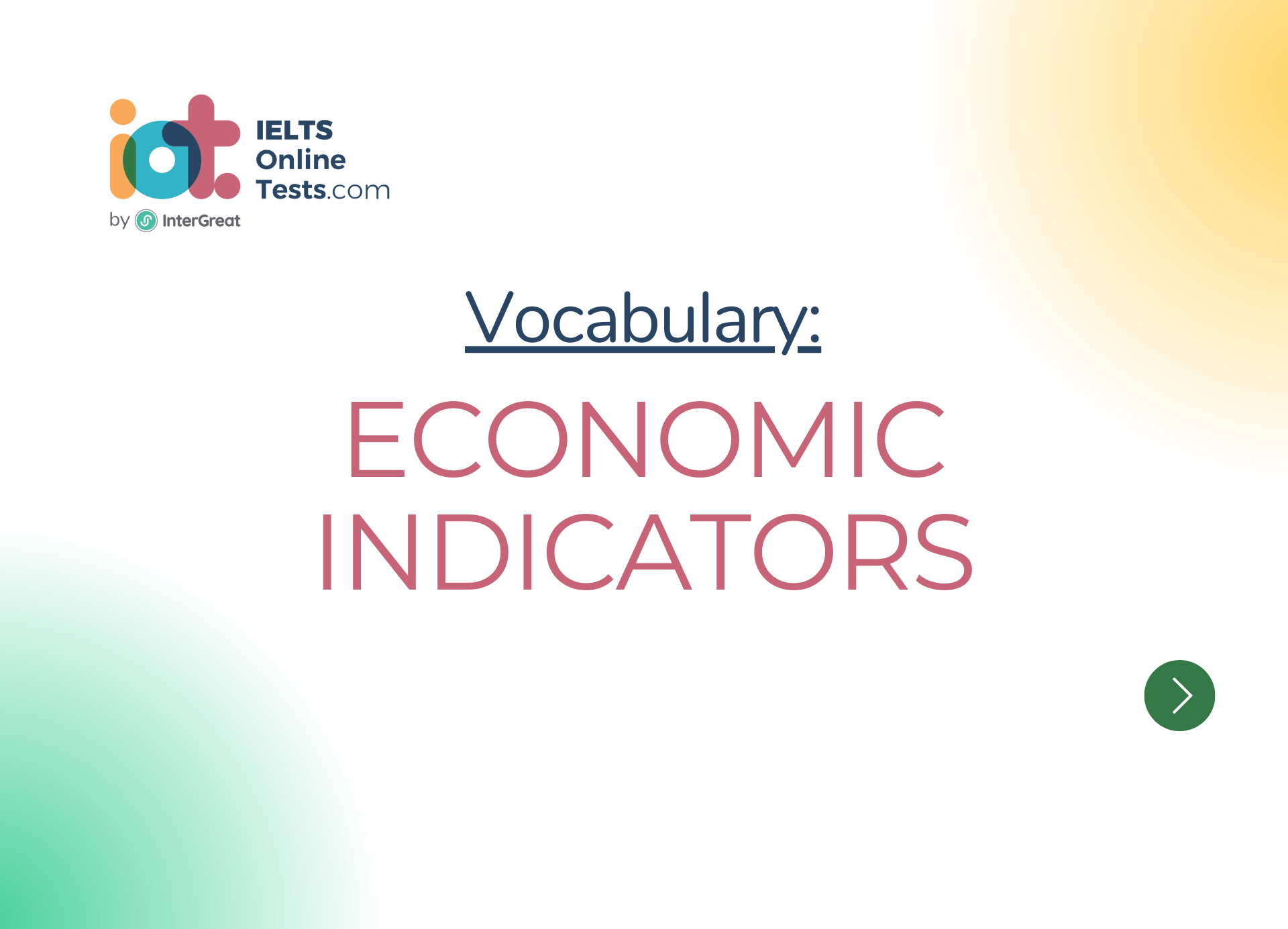
Economic indicators
Here are some vocabulary words related to economic indicators for IELTS band scores 4.5-6.0:
Gross Domestic Product (GDP):
The total monetary value of all goods and services produced within a country's borders in a specific time period, usually a year.
Gross National Product (GNP):
The total monetary value of all goods and services produced by a country's citizens, both domestically and internationally, in a specific time period.
Inflation:
The rate at which the general level of prices for goods and services rises, leading to a decrease in purchasing power.
Consumer Price Index (CPI):
A measure of inflation that tracks changes in the price level of a market basket of consumer goods and services over time.
Unemployment Rate:
The percentage of the labor force that is unemployed and actively seeking employment.
Labor Force Participation Rate:
The percentage of the working-age population that is either employed or actively seeking employment.
Poverty Rate:
The percentage of the population living below the poverty line, which is the minimum income needed to meet basic needs.
Balance of Trade:
The difference between a country's exports and imports of goods.
Trade Deficit:
When a country's imports exceed its exports, resulting in a negative balance of trade.
Trade Surplus:
When a country's exports exceed its imports, resulting in a positive balance of trade.
Current Account:
The sum of the balance of trade, net income from abroad, and net current transfers.
Fiscal Deficit:
When a government's total expenditures exceed its total revenue.
National Debt:
The total amount of money that a country's government has borrowed and still owes.
Interest Rate:
The cost of borrowing money, or the return on investment for lenders.
Stock Market:
A marketplace where stocks, shares, and other financial securities are bought and sold.
Bond Market:
A marketplace where government and corporate bonds are bought and sold.
Economic Growth:
The increase in the production and consumption of goods and services over time.
Economic Development:
The improvement of economic well-being and quality of life in a country.
Foreign Direct Investment (FDI):
Investment made by a company or individual in one country into business interests located in another country.
Economic Indicators:
Statistics and data used to measure and analyze the overall health and performance of an economy.
Leading Indicators:
Economic indicators that change before the economy starts to follow a particular pattern or trend.
Lagging Indicators:
Economic indicators that change after the economy has already started to follow a particular pattern or trend.
Coincident Indicators:
Economic indicators that change at the same time as the overall economy.
Economic Recession:
A period of economic decline, usually measured by a decrease in GDP for two consecutive quarters.
Economic Recovery:
A period of economic growth after a recession or economic downturn.
Economic Boom:
A period of rapid economic growth and prosperity.
Economic Contraction:
A period of economic decline, but less severe than a recession.
Economic Stagnation:
A period of little or no economic growth.
Business Cycle:
The natural rise and fall of economic growth over time.
Per Capita Income:
The average income earned per person in a given area.
Economic Inequality:
The unequal distribution of wealth, income, or resources among individuals or groups within an economy.
Human Development Index (HDI):
A composite index that measures a country's average achievements in three basic dimensions of human development: health, education, and standard of living.
Foreign Aid:
Financial assistance or resources provided by one country to another country to support economic development or humanitarian needs.
Economic Sanctions:
Penalties or restrictions imposed by one or more countries on another country to influence their economic and political behavior.
Trade Agreement:
A pact between two or more countries that outlines the terms and conditions for trading goods and services among them.
Globalization:
The process of increasing interconnectedness and interdependence among countries through trade, investment, technology, and cultural exchange.
Free Trade:
The unrestricted flow of goods and services between countries without tariffs, quotas, or other trade barriers.
Protectionism:
Government policies and practices that restrict or favor domestic industries over foreign competition, often through tariffs or trade barriers.
Sustainable Development:
Economic development that meets the needs of the present generation without compromising the ability of future generations to meet their own needs.
Foreign Direct Investment (FDI):
Investment made by a company or individual in one country into business interests located in another country.
Public Debt:
The total amount of money that a government owes to external creditors and internal bondholders.
Monetary Policy:
The management of the money supply and interest rates by a central bank to control inflation and stabilize the economy.
Fiscal Policy:
The use of government spending and taxation to influence the economy.
Tariffs:
Taxes imposed on imported goods to protect domestic industries or generate revenue for the government.
Subsidies:
Financial assistance or grants provided by the government to support certain industries or activities.
Exchange Rate:
The value of one currency in terms of another, which determines the cost of foreign goods and services.
Global Economic Crisis:
A severe worldwide economic downturn, affecting multiple countries and regions simultaneously.
Economic Recovery:
A period of economic growth after a recession or economic downturn.
Economic Stimulus:
Government actions aimed at boosting economic growth through increased spending or tax cuts.
Economic Sustainability:
The ability of an economy to maintain stable growth and development over the long term.
It's important to understand these economic indicators and their meanings to comprehend economic reports and analyses. Practicing using them in context will improve your understanding and ability to use them effectively in your English language skills for the IELTS exam. Good luck with your studies!




